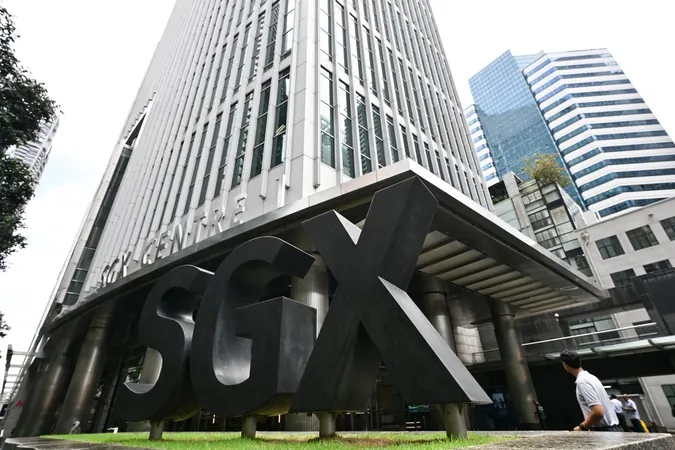
Singapore Stock Market Plummets in Unprecedented Decline Triggered by Global Trade Tensions
2025-04-07
Author: Jia
Singapore Stock Market Experiences Historic Loss
SINGAPORE – On April 7, Asian stock markets experienced a severe downturn, significantly impacting Singapore as the Straits Times Index (STI) fell by 7.5%, marking its most substantial single-day loss since the 2008 financial crisis. The index dropped 285.36 points, closing at 3,497.66, after an initial plunge of over 8% when markets opened.
Global Trade Tensions Fuel Stock Sell-Off
The sell-off was part of a broader global trend driven by heightened concerns over trade tensions. US President Donald Trump's recent refusal to retract global tariffs has fueled fears of a potential recession. Analysts warn that ongoing tariffs could lead to increased inflation and slower economic growth worldwide, raising alarms across the financial markets.
A Significant Volume of Trading
In a striking move, over 600 stocks in Singapore plummeted, with trading volumes soaring to $4.2 billion, nearly triple the daily average for February. This sell-off echoed previous declines during times of crisis, including a 7.4% plunge at the onset of the Covid-19 pandemic in March 2020.
Investor Sentiment Amid Declining Stocks
Experts point out that while the STI's sharp decline is alarming, the atmosphere among investors is considerably calmer than during past crises. Many seasoned investors have adapted to the market's volatility and attribute some initial panic to algorithmic trading systems that responded hastily.
Banking Stocks Hit Hard
Banking stocks bore the brunt of the losses amid fears that impending rate cuts by central banks, including the US Federal Reserve, would harm bank profitability. Major banks like DBS Bank saw a staggering drop of 9.3%, while UOB and OCBC also faced significant losses.
Regional Implications of the Decline
The turmoil extended beyond Singapore, with Hong Kong's Hang Seng Index dropping by 13.2%, marking its worst decline since the 1997 Asian financial crisis, and similar declines observed in other Asian markets, including China and Japan.
European Markets Also Suffering
In Europe, stocks fared no better, with Germany's DAX index sinking by 10% and significant losses reported across major European markets. This global sell-off reflects concerns about the broader economic implications of sustained tariffs.
Political Landscape Influences Markets
President Trump’s recent announcement of potential further tariffs on China and his dismissive remarks regarding the market downturn have only added to the instability. Financial analysts are closely monitoring these developments, given that US stock markets have already seen a monumental loss of approximately $6.5 trillion in value over recent days.
Currency Impact and Economic Policy
While the Singapore dollar dipped slightly against the US dollar, currency values in nations impacted by the new tariffs saw more dramatic declines. Economists predict that the Monetary Authority of Singapore will likely adopt a more accommodative monetary policy in response to these economic challenges in the upcoming weeks.
Advice for Investors
As investors brace for ongoing volatility, experts advise focusing on fundamentally strong stocks with attractive dividend yields and solid financial ratios. This guidance is critical for navigating these turbulent times.
Government Response and Future Outlook
Amid these uncertainties, analysts remain hopeful that the Singapore government stands ready to implement fiscal measures to support households and businesses in the face of a looming global downturn. With a significant fiscal surplus available, there is anticipation of potential stimulus efforts aimed at mitigating the impact of economic challenges ahead.
Conclusion
Investors are urged to remain vigilant and make informed decisions as the market continues to react to evolving global events and trade dynamics. The situation remains fluid, and the long-term ramifications of these trade tensions are yet to be fully realized, leaving many to wonder just how deep the impact will be on Singapore's economy and beyond.





 Brasil (PT)
Brasil (PT)
 Canada (EN)
Canada (EN)
 Chile (ES)
Chile (ES)
 Česko (CS)
Česko (CS)
 대한민국 (KO)
대한민국 (KO)
 España (ES)
España (ES)
 France (FR)
France (FR)
 Hong Kong (EN)
Hong Kong (EN)
 Italia (IT)
Italia (IT)
 日本 (JA)
日本 (JA)
 Magyarország (HU)
Magyarország (HU)
 Norge (NO)
Norge (NO)
 Polska (PL)
Polska (PL)
 Schweiz (DE)
Schweiz (DE)
 Singapore (EN)
Singapore (EN)
 Sverige (SV)
Sverige (SV)
 Suomi (FI)
Suomi (FI)
 Türkiye (TR)
Türkiye (TR)
 الإمارات العربية المتحدة (AR)
الإمارات العربية المتحدة (AR)